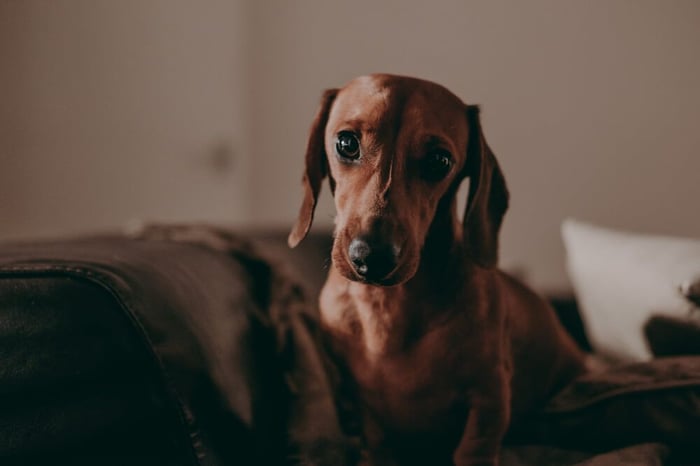Did you know, your doggo is a very social animal?
From interacting with people, to spending time with other dogs, your pooch should have daily opportunities to socialize. In fact, too much alone time might make your pawsome pal feel lonely or distressed, it’s best to avoid leaving them too long.
But what can you do when you do need to leave you doggo for a while? How long should you leave them for and how can you make the experience easier? Spending time away from your pet can be challenging for both of you.There are some general guidelines you can follow. Keep in mind that these can vary, all dogs are individuals, your dog’s past experiences, age, and personality can affect their needs.
How Long Can I Leave My Dog Alone?
As a general rule, you should gradually work up to a maximum time of two hours alone for puppies.
For a dog that is just over 18 months old, you should not leave them alone for more than 4-6 hours, and for adult dogs, around 10 hours is the top limit, especially as dogs should have the opportunity to relieve themselves every 6 hours. Elderly and more senior dogs can be left for between 2-6 hours alone, depending on their individual health issues and stress levels.
Nevertheless, it can be difficult to always be at home for your dog, especially when you’re at work. Luckily, if you do need to leave them alone for a few hours, there are some simple steps you can follow to help your doggo feel at ease!
How To Help Your Dog Feel Comfortable When Home Alone
1. Build up their alone time gradually
If your doggo isn’t used to being alone then it’s not a good idea to go out all day and leave them. Instead, you should gradually build up the length of time you leave them. This training process should start when they are a puppy, if possible, so they learn that being alone isn’t something to be afraid of. This can help prevent the development of separation-related anxiety. Keep in mind that pups will need to pee more frequently and aren’t used to being alone.They shouldn’t be left for more than two hours.

2. Leave your dog with tasty treats and rewards
Before you go out, leave puppy or dog-safe chews, food toys, treats and toys for your dog to discover. Make sure that you don’t leave them with anything to chew that could be hazardous. You can put their normal food in a food toy to keep them occupied and help tire your pooch out. Creating distractions for your pet will help them learn to be comfortable by themselves. They can enjoy their treats, relax and sleep and then, when you return, they’ll learn that it’s not a big deal and there’s no reason to worry.
3. Crate training is recommended for short periods
Although crate training your dog is recommended, leaving your pal confined to their crate is not good for their well-being (and may cause them stress) so they shouldn’t be confined for too long, unless the dog is comfortable in the crate and the crate is big enough. However, you might want to leave your doggo in a large room or separate area without giving them full reign of the house - especially if there are parts of the house that aren’t so dog-friendly. Giving your dog a particular space to stay in is also a useful technique when working up to alone time during training. You’ll know that you can leave them safely in there with treats, puzzles and toys so that they get used not having interaction with you. These treats can also help avoid your dog developing a negative association with you leaving.
4. Keep calm on your arrival home
Don’t make a big deal of your return. Rather than making a fuss of your pooch when you walk in the door, use a calm and gentle greeting such as just saying “hello there.” However, don’t ignore a very distressed dog. Watch out for any accidents as this is an indicator that your dog needs more regular toilet breaks and their alone time should be reduced. Make sure that you take your dog out for a toilet break when you get back. You’ll also want to play games or take them out for exercise and bonding time. Your dog will need to stretch so consider how you can help them burn off some energy! However, try not to associate the play and walks with you immediately returning, by varying the activities.
5. Consider how to lessen their alone time
There are ways to help or limit your dog’s time home alone. You can consider doggy day-care, a dog walker or sitter, and working from home if possible. Simply having someone familiar come by to let your doggo out for a toilet break and a quick run around can help! If your dog is a socialite then they’ll love the company! You could even use a doggy camera so that you can monitor them while you’re out.
Dogs are the perfect companions - that’s why we call them our best friends! So, try to be a good friend to them and don’t leave them alone for too long. If you need to leave them alone then consider using ADAPTIL Calm Home Diffuser which is a simple solution that can help calm and relax your dog at home by providing constant comfort. It supports your pet in situations like loud noises, staying alone, visitors, and other occasions that may make them nervous. Plug the Diffuser in the room where your dog spends most of their time to help reassure them during their alone time.
